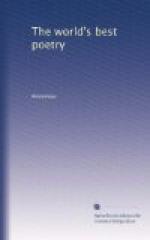O Liberty! can man resign thee,
Once having felt thy generous
flame?
Can dungeons, bolts, or bars confine thee?
Or whips thy noble spirit
tame?
Too long the world has wept, bewailing
That falsehood’s
dagger tyrants wield,
But freedom is
our sword and shield,
And all their arts are unavailing.
To
arms! to arms! ye brave, etc.
From the French of CLAUDE JOSEPH ROUGET DE LISLE.
* * * * *
A COURT LADY.
Her hair was tawny with gold, her eyes
with purple were dark,
Her cheeks’ pale opal burnt with
a red and restless spark.
Never was lady of Milan nobler in name
and in race;
Never was lady of Italy fairer to see
in the face.
Never was lady on earth more true as woman
and wife,
Larger in judgment and instinct, prouder
in manners and life.
She stood in the early morning, and said
to her maidens, “Bring
That silken robe made ready to wear at
the court of the king.
“Bring me the clasps of diamonds,
lucid, clear of the mote,
Clasp me the large at the waist, and clasp
me the small at the throat.
“Diamonds to fasten the hair, and
diamonds to fasten the sleeves,
Laces to drop from their rays, like a
powder of snow from the eaves.”
Gorgeous she entered the sunlight which
gathered her up in a flame,
While straight, in her open carriage,
she to the hospital came.
In she went at the door, and gazing, from
end to end,
“Many and low are the pallets, but
each is the place of a friend.”
Up she passed through the wards, and stood
at a young man’s bed:
Bloody the band on his brow, and livid
the droop of his head.
“Art thou a Lombard, my brother?
Happy art thou!” she cried,
And smiled like Italy on him: he
dreamed in her face and died.
Pale with his passing soul, she went on
still to a second:
He was a grave, hard man, whose
years by dungeons were reckoned.
Wounds in his body were sore, wounds in
his life were sorer.
“Art thou a Romagnole?” Her
eyes drove lightnings before her.
“Austrian and priest had joined
to double and tighten the cord
Able to bind thee, O strong one,—free
by the stroke of a sword.
“Now be grave for the rest of us,
using the life overcast
To ripen our wine of the present (too
new) in glooms of the past.”
Down she stepped to a pallet where lay
a face like a girl’s,
Young, pathetic with dying,—a
deep black hole in the curls.
“Art thou from Tuscany, brother?
and seest thou, dreaming in pain,
Thy mother stand in the piazza, searching
the list of the slain?”
Kind as a mother herself, she touched
his cheeks with her hands:
“Blessed is she who has borne thee,
although she should weep as she
stands.”




